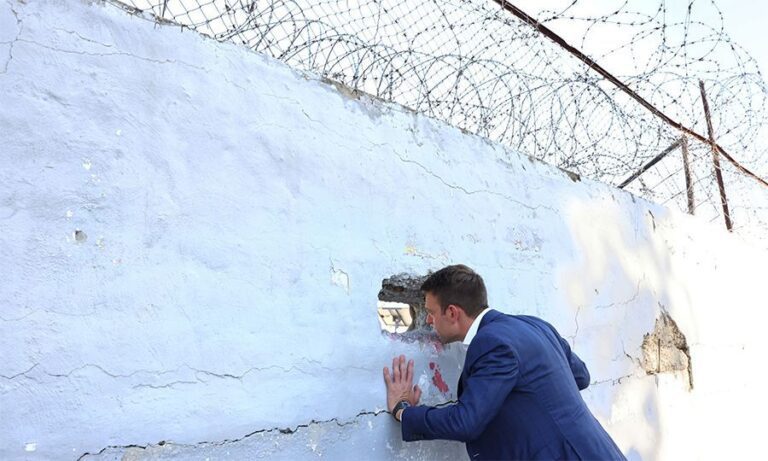The image of Stefanos Kasselakis, president of SYRIZA, looking through a hole in the wall, reminiscent of a fighting stance used to aim a rifle, in the buffer zone behind the parking lot of the Ledra Pallas barricade, sums up the essence of Greek policy regarding the Cyprus problem.
This is not unique to Mr. Kasselakis, who unexpectedly made headlines and is now making headlines thanks to this iconic image in his political communications. This question affects all Greek politicians over time.
However, few, if any, of the current generation truly grasp the Cyprus problem – not just as an unresolved issue or facet of Greek foreign policy, but as a tangible reality on the ground, shaping the topography, daily life and even psychology. perspectives.
Mr Kasselakis’ discomfort in his statements after his meeting with the president, coupled with his limited knowledge of the issue – a trait shared by many front-line politicians in Greece – became evident.
He also made a verbal misstep earlier, although he later apologized. As a political leader, he will likely learn, as politicians often do, from advisors familiar with the historical, diplomatic and political context of the Cyprus problem and the negotiations aimed at resolving it.
Yet Mr Kasselakis’ presence in Cyprus seemed almost “choreographed”, precisely because it reflects the way in which the Cyprus problem has inevitably entered the post-political era, almost half a century after the invasion from 1974.
The Cyprus question and its metapolitical aspects do not only concern Greek politicians, academics or public commentators; this mainly affects those in Cyprus itself. Former President Anastasiades, who presided over the country during the height of the Cyprus problem in 2017, was the last of a generation who experienced the problem in its historical dimensions before 1974.
Today, in both Cyprus and Greece, the main political actors – government officials, opposition figures, frontline leaders and MPs – belong to the so-called “post-war generation”. “. They have no personal memories of the Acheson plans, the coup or the invasion, which they acquired through academic study and literature.
More importantly, they may not fully understand that the Cyprus problem and metapolitics, which often prioritize image and communication over substance, can be a problematic and potentially dangerous combination.
Coming back to Mr Kasselakis, his presence in Cyprus creates considerable intrigue. His judgment will depend on whether the Cyprus issue becomes, as is often the case in Greek politics, a tool of opposition to the Greek-Turkish dialogue promoted by the Mitsotakis government or, conversely, a tool of petty politics in Cyprus, like what happened in 2017 concerning responsibilities in the Crans Montana sinking and the involvement of Nikos Kotzias, then Minister of Foreign Affairs of SYRIZA.
Finally, a remark on post-politics: before passing any judgment, whether positive or negative, on the work and image of Mr. Kasselakis, it is imperative, especially in the current climate in Cyprus, to do so. do while recognizing that Cypriot politicians do not compromise in terms of image and communication.
(This article has been translated from its Greek original)


